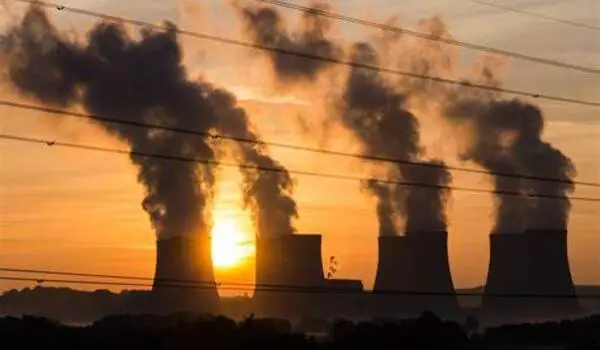Scientists present new evidence to support the rapid phaseout of fossil fuels. The scientists used an updated atmospheric composition model, a newly developed relative risk model, and recent satellite-based fine particle data to determine exposure to ambient air pollution and its health effects. They calculated total and disease-specific mortality and assigned it to emission categories. They demonstrate that transitioning away from fossil fuels is a remarkably effective health-improving and life-saving intervention. Around 5 million unnecessary deaths per year could be avoided globally.
According to a new study, the mortality burden attributable to air pollution from fossil fuel use is significantly higher than most previous estimates; phasing out fossil fuels would have enormous, positive health consequences.
Air pollution remains a major public health concern. Previous estimates of the attributable mortality burden varied significantly across studies, owing to differences in exposure-response relationships and the causes of death included. Furthermore, only a few global studies linked mortality to specific sources of air pollution.
In a new study, the research team led by Jos Lelieveld and Andrea Pozzer from the Max Planck Institute for Chemistry and Andy Haines from the London School of Hygiene & Tropical Medicine assesses the consequences of a fossil fuel phaseout for disease-specific and all-cause mortality through the concomitant effects of air pollution.
We estimate that 5.13 million extra deaths per year are attributable to ambient air pollution from fossil fuel use, which could potentially be avoided by phasing out fossil fuels. This corresponds to 82% of the maximum number of air pollution deaths that could be averted by controlling all anthropogenic emissions.
Jos Lelieveld
The majority of the mortality burden (52%) is attributed to cardiometabolic conditions, particularly ischaemic heart disease, which can lead to heart attacks (30%), according to the researchers. Stroke and chronic obstructive pulmonary disease account for about 16% of all deaths. Around 20% is unknown, with arterial hypertension, diabetes, and neurodegenerative diseases all being possibilities.
“We estimate that 5.13 million extra deaths per year are attributable to ambient air pollution from fossil fuel use, which could potentially be avoided by phasing out fossil fuels,” says Jos Lelieveld, director of the Max Planck Institute for Chemistry. “This corresponds to 82% of the maximum number of air pollution deaths that could be averted by controlling all anthropogenic emissions.”
The new results were accomplished by applying a new relative risk model that optimizes the exposure-response relationship throughout the global range of ambient exposure levels. In addition, estimates of cause-specific and all-cause mortality due to long-term exposure to particulate matter (PM2.5) and ozone (O3) are attributed to pollution sources in this study.

Study design: Atmospheric modeling method distinguishes source categories The scientists developed a data-constrained global atmospheric modeling method to compute gaseous and particulate air pollutants and attributed them to source categories. The atmospheric model was used to calculate the fractional changes in PM2.5 related to emission sectors based on computer simulations in which source categories have been sequentially switched off.
“Our model calculated fractional changes were then applied to the high-resolution observational particulate pollution data to determine exposure reductions according to four emission scenarios,” Andrea Pozzer, a researcher, explains. The first scenario assumes that all sources of emissions related to fossil fuels are phased out. The second and third scenarios, “quarterway” and “halfway,” assume that 25% and 50% of the exposure reduction towards the fossil phaseout are realized, respectively. Finally, the fourth removes all anthropogenic sources from the equation, leaving only natural sources such as aeolian dust, marine and terrestrial biosphere emissions, and natural wildfires to account for. Since the responses are not strongly non-linear, the team of scientists concludes that fossil fuel-related emission reductions at all levels of air pollution can decrease the number of attributable deaths substantially.
“Ambient air pollution would no longer be a leading environmental health risk factor if the use of fossil fuels were superseded by equitable access to clean sources of renewable energy,” emphasizes epidemiologist Andy Haines from the London School of Hygiene & Tropical Medicine. “This study provides new evidence to motivate rapid fossil fuel phaseout.” Phasing out fossil fuels is a remarkably effective health-improving and life-saving intervention and a major cost-benefit of the United Nations’ goal of climate neutrality by 2050.
Air pollution remains a major public health concern. Previous estimates of the attributable mortality burden varied significantly across studies, owing to differences in exposure-response relationships and the causes of death included. Furthermore, only a few global studies linked mortality to specific sources of air pollution. The research team led by Jos Lelieveld and Andrea Pozzer from the Max Planck Institute for Chemistry and Andy Haines from the London School of Hygiene & Tropical Medicine assesses the consequences of a fossil fuel phaseout for disease-specific and all-cause mortality via the concomitant effects of air pollution in a new study.
The researchers find that most (52%) of the mortality burden is related to cardiometabolic conditions, particularly ischaemic heart disease that can cause heart attacks (30%). Stroke and chronic obstructive pulmonary disease both account for about 16%. About 20% is undefined, with arterial hypertension, diabetes mellitus, and neurodegenerative diseases possibly implicated.
“We estimate that 5.13 million extra deaths per year are attributable to ambient air pollution from fossil fuel use, which could potentially be avoided by phasing out fossil fuels,” says Jos Lelieveld, director of the Max Planck Institute for Chemistry. “This corresponds to 82% of the maximum number of air pollution deaths that could be averted by controlling all anthropogenic emissions.”
The new findings were obtained by using a new relative risk model that optimizes the exposure-response relationship across the entire global range of ambient exposure levels. Furthermore, this study attributes estimates of cause-specific and all-cause mortality to long-term exposure to particulate matter (PM2.5) and ozone (O3) pollution sources.
Study design: Atmospheric modeling method distinguishes source categories
The researchers created a data-constrained global atmospheric modeling method to calculate gaseous and particulate air pollutants and assign them to source categories. Based on computer simulations in which source categories were sequentially turned off, the atmospheric model was used to calculate the fractional changes in PM2.5 related to emission sectors.
“Our model calculated fractional changes were then applied to the high-resolution observational particulate pollution data to determine exposure reductions according to four emission scenarios,” Andrea Pozzer, a researcher, explains. The first scenario assumes that all sources of emissions related to fossil fuels are phased out. The second and third scenarios, “quarterway” and “halfway,” assume that 25% and 50% of the exposure reduction towards the fossil phaseout are realized, respectively.
Finally, the fourth removes all anthropogenic sources from the equation, leaving only natural sources such as aeolian dust, marine and terrestrial biosphere emissions, and natural wildfires to account for. Because the responses are not strongly non-linear, the scientists conclude that reducing fossil fuel-related emissions at all levels of air pollution can significantly reduce the number of attributable deaths.
















